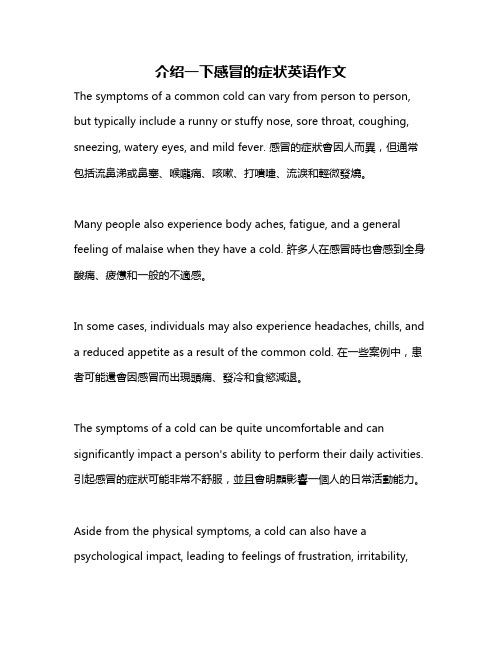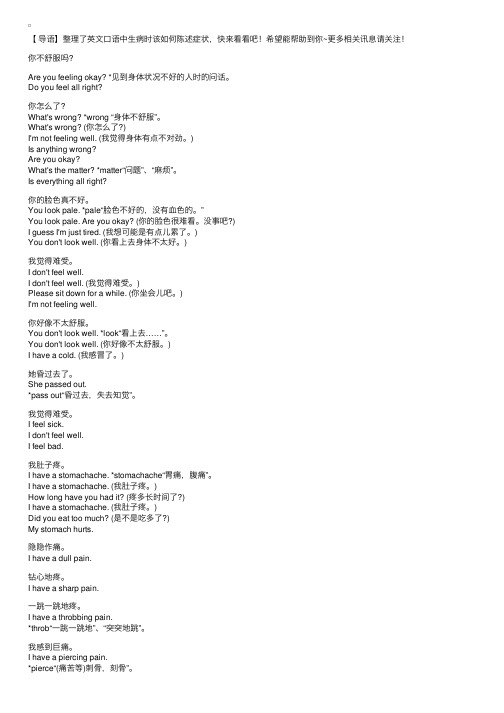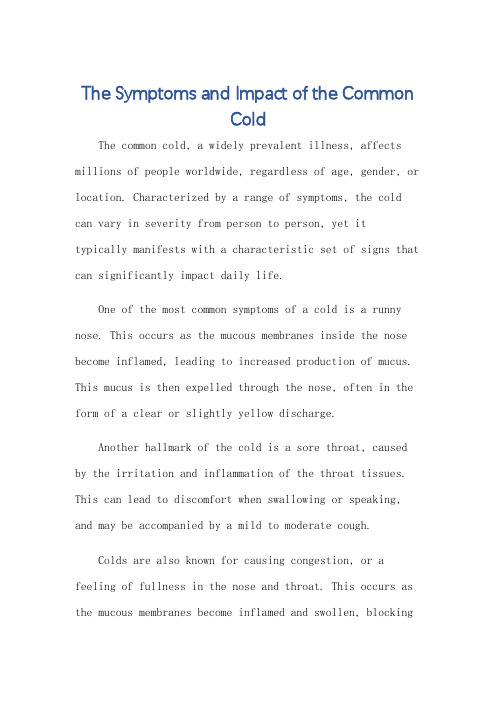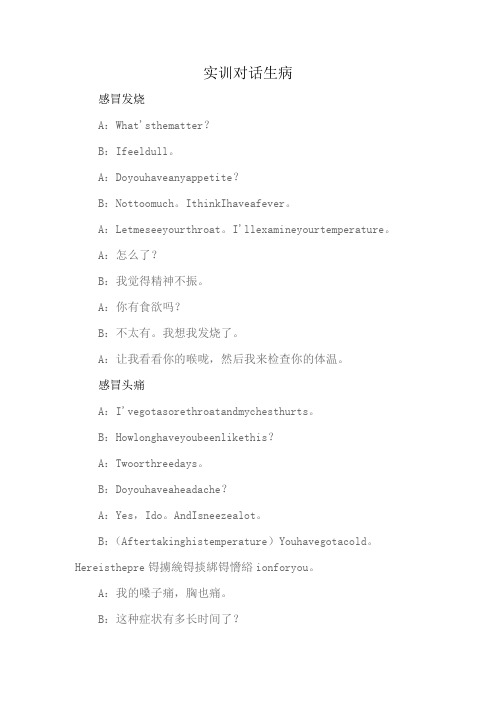托福口语:如何描述感冒症状
怎么用英文描述感冒症状非常实用

怎么用英文描述感冒症状非常实用
最近南方北方都已进入寒冬,大家一定要注意保暖,不要感冒,如果不小心中招了,你知道怎么用英文表达常见症状吗,马上来学!
第一句
我昨天由于流感病倒了。
Yesterday, I went down with the flu.
go down: 被打倒
flu:流感
第二句
我早上一直咳嗽。
I kept coughing all morning.
coughing: 咳嗽
第三句
我流鼻涕。
I have a runny nose.
runny: 流鼻涕的,水份多的
第四句
我觉得头晕目眩。
I'm feeling dizzy.
dizzy: 眩晕的,形容失去平衡要跌倒的状态
第五句
我浑身肌肉酸痛。
My muscle ache.
arche: 疼痛(可做动词也可做名词)
第六句
我感到浑身乏力。
I'm feeling weak.
weak: 虚弱的。
英语口语8000句:陈述症状(生病、受伤时)

这篇《英语⼝语8000句:陈述症状(⽣病、受伤时)》,是特地为⼤家整理的,供⼤家参考!●陈述症状你不舒服吗?Are you feeling okay? *见到⾝体状况不好的⼈时的问话。
Do you feel all right?你怎么了?What's wrong? *wrong “⾝体不舒服”。
What's wrong? (你怎么了?)I'm not feeling well. (我觉得⾝体有点不对劲。
)Is anything wrong?Are you okay?What's the matter? *matter“问题”、“⿇烦”。
Is everything all right?你的脸⾊真不好。
You look pale. *pale“脸⾊不好的,没有⾎⾊的。
”You look pale. Are you okay? (你的脸⾊很难看。
没事吧?)I guess I'm just tired. (我想可能是有点⼉累了。
)You don't look well. (你看上去⾝体不太好。
)我觉得难受。
I don't feel well.I don't feel well. (我觉得难受。
)Please sit down for a while. (你坐会⼉吧。
)I'm not feeling well.你好像不太舒服。
You don't look well. *look“看上去……”。
You don't look well. (你好像不太舒服。
)I have a cold. (我感冒了。
)她昏过去了。
She passed out. *pass out“昏过去,失去知觉”。
我觉得难受。
I feel sick.I don't feel well.I feel bad.我肚⼦疼。
I have a stomachache. *stomachache“胃痛,腹痛”。
介绍一下感冒的症状英语作文

介绍一下感冒的症状英语作文The symptoms of a common cold can vary from person to person, but typically include a runny or stuffy nose, sore throat, coughing, sneezing, watery eyes, and mild fever. 感冒的症狀會因人而異,但通常包括流鼻涕或鼻塞、喉嚨痛、咳嗽、打噴嚏、流淚和輕微發燒。
Many people also experience body aches, fatigue, and a general feeling of malaise when they have a cold. 許多人在感冒時也會感到全身酸痛、疲憊和一般的不適感。
In some cases, individuals may also experience headaches, chills, and a reduced appetite as a result of the common cold. 在一些案例中,患者可能還會因感冒而出現頭痛、發冷和食慾減退。
The symptoms of a cold can be quite uncomfortable and can significantly impact a person's ability to perform their daily activities. 引起感冒的症狀可能非常不舒服,並且會明顯影響一個人的日常活動能力。
Aside from the physical symptoms, a cold can also have a psychological impact, leading to feelings of frustration, irritability,and even sadness due to the discomfort and inconvenience it causes. 除了身體症狀之外,感冒還會對心理產生影響,引起挫折感、煩躁甚至悲傷,正是因為它帶來的不適和不便。
英文口语中生病时该如何陈述症状

【导语】整理了英⽂⼝语中⽣病时该如何陈述症状,快来看看吧!希望能帮助到你~更多相关讯息请关注!你不舒服吗?Are you feeling okay? *见到⾝体状况不好的⼈时的问话。
Do you feel all right?你怎么了?What's wrong? *wrong “⾝体不舒服”。
What's wrong? (你怎么了?)I'm not feeling well. (我觉得⾝体有点不对劲。
)Is anything wrong?Are you okay?What's the matter? *matter“问题”、“⿇烦”。
Is everything all right?你的脸⾊真不好。
You look pale. *pale“脸⾊不好的,没有⾎⾊的。
”You look pale. Are you okay? (你的脸⾊很难看。
没事吧?)I guess I'm just tired. (我想可能是有点⼉累了。
)You don't look well. (你看上去⾝体不太好。
)我觉得难受。
I don't feel well.I don't feel well. (我觉得难受。
)Please sit down for a while. (你坐会⼉吧。
)I'm not feeling well.你好像不太舒服。
You don't look well. *look“看上去……”。
You don't look well. (你好像不太舒服。
)I have a cold. (我感冒了。
)她昏过去了。
She passed out.*pass out“昏过去,失去知觉”。
我觉得难受。
I feel sick.I don't feel well.I feel bad.我肚⼦疼。
I have a stomachache. *stomachache“胃痛,腹痛”。
生病了口语交际英语作文

生病了口语交际英语作文Title: Dealing with Illness: A Lesson in Spoken English Communication。
Introduction:Being sick is an inevitable part of life, and it can often disrupt our daily routines, including our ability to effectively communicate in English. In this essay, we'll explore how to navigate conversations in English whenyou're feeling under the weather.Understanding the Situation:When you're not feeling well, it's important to convey that to others in a clear and concise manner. Here are some phrases you can use to express how you're feeling:1. "I'm feeling a bit under the weather today."2. "I'm not feeling my best at the moment."3. "I think I might be coming down with something."These phrases can help you communicate your condition without going into too much detail.Seeking Assistance:If you need help or assistance while you're sick, it's essential to communicate your needs effectively. Here are some phrases you can use:1. "Could you please help me get some medicine?"2. "I'm not feeling well. Is there someone who can cover for me at work?"3. "I think I need to see a doctor. Can you help me find a clinic?"By clearly expressing your needs, you can ensure thatothers understand how they can assist you during your illness.Explaining Symptoms:When talking to others about your symptoms, it's helpful to be specific. Here are some phrases you can use to describe how you're feeling:1. "I have a headache and a sore throat."2. "I've been coughing a lot, and I have a fever."3. "I feel really tired, and my body aches all over."Being specific about your symptoms can help others understand the severity of your illness and provide appropriate support.Expressing Gratitude:When someone offers help or support while you're sick,it's essential to express your gratitude. Here are some phrases you can use:1. "Thank you so much for helping me out."2. "I really appreciate your support during this time."3. "I'm grateful for your kindness and understanding."Showing gratitude not only acknowledges the assistance you've received but also strengthens your relationshipswith others.Conclusion:Communicating effectively in English while you're sick can be challenging, but by using the right phrases and expressions, you can convey your needs and feelings clearly. Remember to be specific about your symptoms, seekassistance when needed, and express gratitude for any support you receive. By doing so, you can navigateconversations with confidence, even when you're not feeling your best.。
介绍一下感冒的症状英语作文

The Symptoms and Impact of the CommonColdThe common cold, a widely prevalent illness, affects millions of people worldwide, regardless of age, gender, or location. Characterized by a range of symptoms, the cold can vary in severity from person to person, yet ittypically manifests with a characteristic set of signs that can significantly impact daily life.One of the most common symptoms of a cold is a runny nose. This occurs as the mucous membranes inside the nose become inflamed, leading to increased production of mucus. This mucus is then expelled through the nose, often in the form of a clear or slightly yellow discharge.Another hallmark of the cold is a sore throat, caused by the irritation and inflammation of the throat tissues. This can lead to discomfort when swallowing or speaking, and may be accompanied by a mild to moderate cough.Colds are also known for causing congestion, or a feeling of fullness in the nose and throat. This occurs as the mucous membranes become inflamed and swollen, blockingthe passage of air. Congestion can lead to difficulty breathing, especially when sleeping, and may contribute toa stuffy nose and postnasal drip.Many people with colds also experience fatigue and a general feeling of being unwell. This is due to the body's immune response to the virus, which requires additional energy and resources. Fatigue can lead to a decrease in activity levels and a desire to rest.Other common symptoms of the cold include fever, chills, and body aches. Fever is a result of the body's attempt to raise its temperature to fight the virus, while chills area sensation of feeling cold despite being at a normal or elevated temperature. Body aches, particularly in the muscles, are caused by the release of inflammatorychemicals during the immune response.The duration of a cold typically ranges from a few days to a week or more, depending on the individual's immune response and the severity of the illness. In most cases,the symptoms gradually improve as the body fights off the virus and recovers. However, in some cases, the cold can lead to more serious complications, such as bronchitis orsinus infections, particularly for those with compromised immune systems or chronic health conditions.In conclusion, the common cold is a widespread illness characterized by a range of symptoms that can significantly impact daily life. From a runny nose and sore throat to congestion, fatigue, and fever, the symptoms of the cold vary in severity but are typically manageable with rest and over-the-counter medications. However, it is important to be aware of potential complications and to seek medical attention if symptoms worsen or do not improve within a reasonable timeframe.**感冒的症状及其影响**感冒,一种广泛流行的疾病,无论年龄、性别或地点,全世界都有数百万人受到影响。
感冒发烧的英语口语

感冒发烧的英语⼝语感冒发烧的英语⼝语 说道感冒⼤家第⼀个想到的'就是发烧、咳嗽了吧。
下⾯是⼩编整理的关于感冒的英语⼝语,欢迎⼤家阅读! 我要买些感冒药 Doctor: What can I do for you? 有什么需要的吗? May: I need some medicine. 我需要⼀些药。
Doctor: For whom? 给谁的。
May: My younger brother. He suffers from a bad cold. 我弟弟。
他着凉了,很难受。
Doctor: What symptoms does he have? 他有什么症状? May: Fever and a bad cough. 发烧,咳嗽也很厉害。
Doctor: I got it. Don't worry, just a common cold. 知道了,别担⼼,只是普通感冒。
May: What kind of medicine does he need? 他需要什么样的药品呢? Doctor: Patulin will do. 感冒药就可以了。
May: How many pills for each time? 每次要吃多少粒啊? Doctor: Six per day, and two after each meal. ⼀天六粒,每顿饭后两粒。
May: Thank you very much. ⾮常感谢。
Doctor: My pleasure. 乐意效劳。
头疼⽽且咳嗽得很历害 Doctor: What's your trouble? 怎么不舒服? May: I've got a headache and I've coughed badly. 我头疼⽽且咳嗽得很历害。
Doctor: Have you taken your temperature? 试过体温了吗? May: Yes, thirty-eight point six. 试过了,三⼗⼋度六。
医学英语口语感冒的常用英语表达

1. I've got a cold.I've got a bad cold.我感冒了。
/我感冒很严重。
2. I've got a runny nose.My nose is running.我流鼻涕。
3. I've got a sore throat.我嗓子疼。
4. I've been coughing day and night.我一直在咳嗽。
5. I can't stop sneezing.我打喷嚏打个不停。
6. I've got a temperature.I'm running a high fever.我发烧了。
我发高烧。
7. I've got a very bad headache.This headache is killing me.我头很痛。
我头快痛死了。
8. I feel sore and ache all over.我觉得全身酸痛。
9. I am trembling with cold.我冷得全身发抖。
10. I feel like I'm dying.我觉得我好像要死了一样。
11. I feel dizzy.My head is swimming.我头晕。
我头昏脑胀的。
12. I have a stuffy nose.我的鼻子不通气。
13. He has been coughing up rusty or greenish-yellow phlegm.他咳嗽带有绿黄色的痰。
14. His eyes feel itchy and he has been sneezing.他眼睛发痒,而且一直在打喷嚏。
15. He has a fever, aching muscles and hacking cough. (hacking = constant)他有发烧,筋骨酸痛和常常咳嗽。
16. He coughed with sputum and feeling of malaise. (malaise = debility)他咳嗽有浓痰,而且觉得很虚弱。
实训对话生病

实训对话生病感冒发烧A:What'sthematter?B:Ifeeldull。
A:Doyouhaveanyappetite?B:Nottoomuch。
IthinkIhaveafever。
A:Letmeseeyourthroat。
I'llexamineyourtemperature。
A:怎么了?B:我觉得精神不振。
A:你有食欲吗?B:不太有。
我想我发烧了。
A:让我看看你的喉咙,然后我来检查你的体温。
感冒头痛A:I'vegotasorethroatandmychesthurts。
B:Howlonghaveyoubeenlikethis?A:Twoorthreedays。
B:Doyouhaveaheadache?A:Yes,Ido。
AndIsneezealot。
B:(Aftertakinghistemperature)Youhavegotacold。
Hereisthepre锝擄絻锝掞綁锝愶綌ionforyou。
A:我的嗓子痛,胸也痛。
B:这种症状有多长时间了?A:两三天了。
B:头痛吗?A:头痛,还老打喷嚏。
B:(量了体温后)你得了感冒了。
这是你的药方。
头晕A:Mr。
Smith,don'tyoufeelwell?You'relookingratherpale。
What'supwithyou?Doyouhaveatemperature?B:No,butIfeeldizzy。
I'mnotfeelingverywellthesedays。
I'lldescribetoyouthesymptomsofmyillness。
A:Maybeyou'retiredafterthejourney。
B:It'sverylikely。
A:史密斯先生,你不舒服吗?你看起来面色苍白,出什么事儿啦?你发烧吗?B:没有,就是有点头晕。
这些天来我觉得不大舒服,我把症状给你说说。
- 1、下载文档前请自行甄别文档内容的完整性,平台不提供额外的编辑、内容补充、找答案等附加服务。
- 2、"仅部分预览"的文档,不可在线预览部分如存在完整性等问题,可反馈申请退款(可完整预览的文档不适用该条件!)。
- 3、如文档侵犯您的权益,请联系客服反馈,我们会尽快为您处理(人工客服工作时间:9:00-18:30)。
托福口语:如何描述感冒症状
小马过河为大家准备了“托福口语:如何描述感冒症状”,供各位备考托福的考生们参考使用,来提高自己的托福成绩!免费咨询电话:400-0123-267
托福口语如何描述感冒症状
已经是4月中旬了,可这天气还是时冷时暖的,让人有点摸不透。
看着窗外大好的阳光,很多人穿着单衣就出门了,结果被寒风吹得直哆嗦,喷嚏也就接踵而至了。
今天,我们就来说说各种感冒症状的表达吧。
1. I've got a cold. / I've got a bad cold.
我感冒了。
/ 我感冒很严重。
2. I've got a runny nose. / My nose is running.
我流鼻涕。
3. I've got a sore throat.
我嗓子疼。
4. I've been coughing day and night.
我一直在咳嗽。
5. I can't stop sneezing.
我打喷嚏打个不停。
6. I've got a temperature. / I'm running a high fever.
我发烧了。
/ 我发高烧。
7. I've got a very bad headache. / This headache is killing me.
我头很痛。
/我头快痛死了。
8. I feel sore and ache all over.
我觉得全身酸痛。
9. I am trembling with cold.
我冷得全身发抖。
10. I feel like I'm dying.
我觉得我好像要死了一样。
11. I feel dizzy. / My head is swimming.
我头晕。
/ 我头昏脑胀的。
12. I have a stuffy nose.
我的鼻子不通气。
来源于:小马过河小马过河资料下载频道,欢迎您来下载!。
